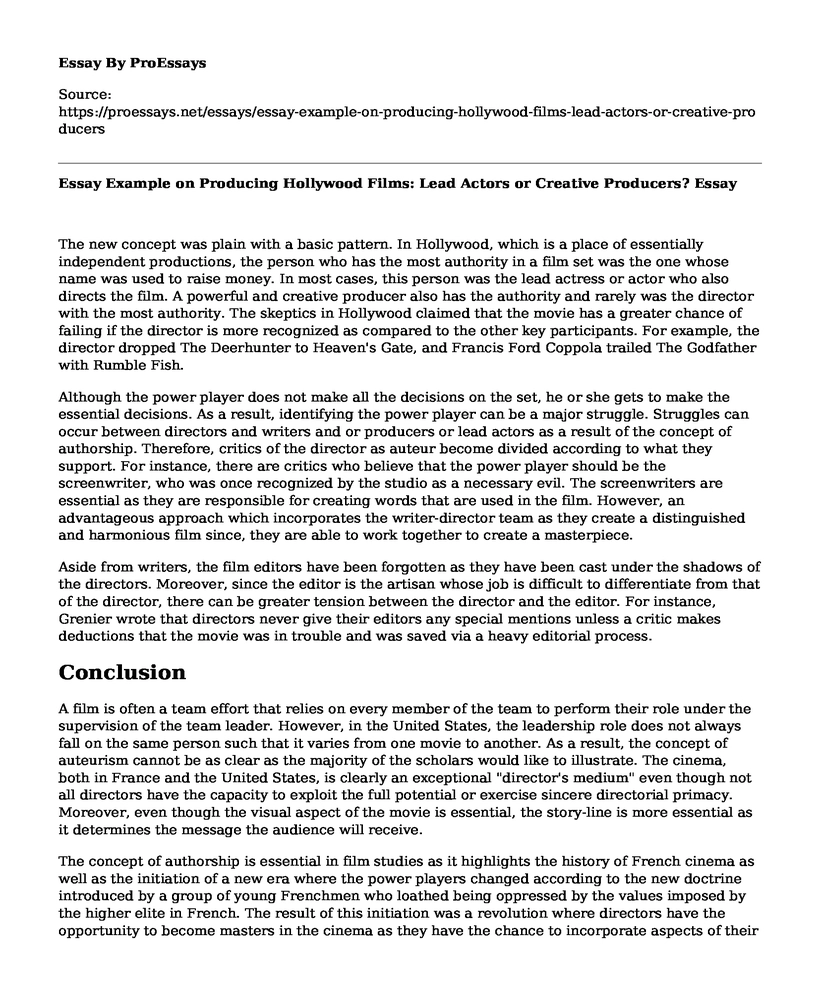The new concept was plain with a basic pattern. In Hollywood, which is a place of essentially independent productions, the person who has the most authority in a film set was the one whose name was used to raise money. In most cases, this person was the lead actress or actor who also directs the film. A powerful and creative producer also has the authority and rarely was the director with the most authority. The skeptics in Hollywood claimed that the movie has a greater chance of failing if the director is more recognized as compared to the other key participants. For example, the director dropped The Deerhunter to Heaven's Gate, and Francis Ford Coppola trailed The Godfather with Rumble Fish.
Although the power player does not make all the decisions on the set, he or she gets to make the essential decisions. As a result, identifying the power player can be a major struggle. Struggles can occur between directors and writers and or producers or lead actors as a result of the concept of authorship. Therefore, critics of the director as auteur become divided according to what they support. For instance, there are critics who believe that the power player should be the screenwriter, who was once recognized by the studio as a necessary evil. The screenwriters are essential as they are responsible for creating words that are used in the film. However, an advantageous approach which incorporates the writer-director team as they create a distinguished and harmonious film since, they are able to work together to create a masterpiece.
Aside from writers, the film editors have been forgotten as they have been cast under the shadows of the directors. Moreover, since the editor is the artisan whose job is difficult to differentiate from that of the director, there can be greater tension between the director and the editor. For instance, Grenier wrote that directors never give their editors any special mentions unless a critic makes deductions that the movie was in trouble and was saved via a heavy editorial process.
Conclusion
A film is often a team effort that relies on every member of the team to perform their role under the supervision of the team leader. However, in the United States, the leadership role does not always fall on the same person such that it varies from one movie to another. As a result, the concept of auteurism cannot be as clear as the majority of the scholars would like to illustrate. The cinema, both in France and the United States, is clearly an exceptional "director's medium" even though not all directors have the capacity to exploit the full potential or exercise sincere directorial primacy. Moreover, even though the visual aspect of the movie is essential, the story-line is more essential as it determines the message the audience will receive.
The concept of authorship is essential in film studies as it highlights the history of French cinema as well as the initiation of a new era where the power players changed according to the new doctrine introduced by a group of young Frenchmen who loathed being oppressed by the values imposed by the higher elite in French. The result of this initiation was a revolution where directors have the opportunity to become masters in the cinema as they have the chance to incorporate aspects of their personalities and creativity into the film as a unique signature. Although this notion is educative, it has its own problems, such as the issue between the true author in regards to the tense relationship often witnessed between the editors and directors in the United States. Some issues presented by this theory may never be solved. Instead, the film industry can learn from the current mistakes and attempt to provide a middle-ground where all the team members are given the credit they deserve. Only then can the cinema create a revolutionary film.
Bibliography
Andrew, J. D. Concepts in Film Theory. New York: Oxford University Press, 1984.
Grenier, Richard. "Truffaut & Other Auteurs." Commentary. Last modified March 1986. https://www.commentarymagazine.com/articles/richard-grenier/truffaut-other-auteurs/.
Johnny Guitar. Directed by Nicholas Ray. 1954. Republic Pictures, 1954. Film.
Kuhn, Annette, and Guy Westwell. A Dictionary of Film Studies. New York: Oxford University Press, 2012.
Schur, Thomas. "Film, Relay, and System: A Systems Theory Approach to Cinema." UWM Digital Commons | University of Wisconsin Milwaukee Research. Last modified August 2013. https://dc.uwm.edu/cgi/viewcontent.cgi?article=1762&context=etd.
Cite this page
Essay Example on Producing Hollywood Films: Lead Actors or Creative Producers?. (2023, May 17). Retrieved from https://proessays.net/essays/essay-example-on-producing-hollywood-films-lead-actors-or-creative-producers
If you are the original author of this essay and no longer wish to have it published on the ProEssays website, please click below to request its removal:
- Becoming a Professional Ballet Dancer
- Chinese Film HERO by Ying Xiong
- Film Criticism: Strangers on a Train and Run Lola Run
- Social Media Sites Which Are Frequently Used to Find Partners
- Essay on How Walt Disney Ruined Our Love Lives: The Impact on Modern Romantic Relationships
- Alia Bhatt in Raazi: Tradition-Bound Marriage, Freedom Fighter Father - Essay Sample
- Paper Example on Theater as a Medium for Change: Amy Fritsche's Insight







